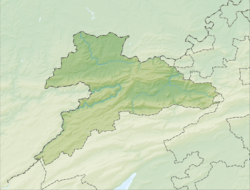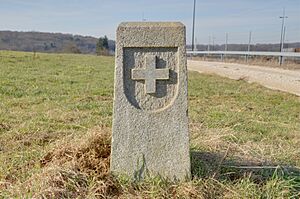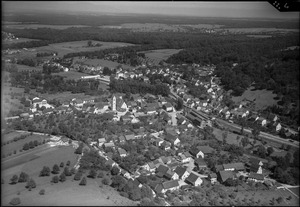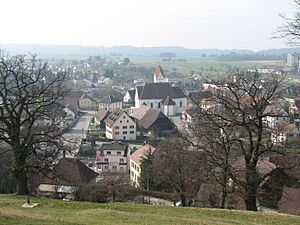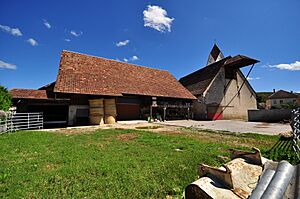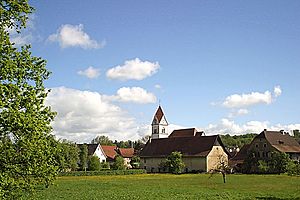Boncourt, Switzerland facts for kids
Quick facts for kids
Boncourt
|
||
|---|---|---|
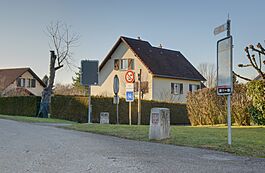
French/Swiss border at Boncourt village
|
||
|
||
| Country | Switzerland | |
| Canton | Jura | |
| District | Porrentruy | |
| Area | ||
| • Total | 9.02 km2 (3.48 sq mi) | |
| Elevation | 373 m (1,224 ft) | |
| Population
(Dec 2020 )
|
||
| • Total | 1,195 | |
| • Density | 132.48/km2 (343.1/sq mi) | |
| Postal code |
2926
|
|
| Surrounded by | Buix, Villars-le-Sec (F), Saint-Dizier-l'Évêque (F), Lebetain (F), Delle (F), Florimont (F), Courcelles (F) | |
Boncourt is a town, also called a municipality, in Switzerland. It is located in the Jura canton, which is like a state or region in Switzerland. Boncourt is part of the Porrentruy district. It sits right on the border with France, making it an important crossing point.
Contents
History of Boncourt
Boncourt was first mentioned in old writings in the year 1140. Back then, it was known as Bononis Curia. For a while, it also had a German name, Bubendorf, but that name is not used anymore. During the Second World War, Boncourt was a very important place. It helped connect French-speaking parts of Switzerland and was a key spot for the resistance movement.
Geography of Boncourt
Boncourt covers an area of about 9 square kilometers (3.5 square miles). A large part of this land, about 41.5%, is used for farming. Forests cover another big part, about 38% of the area. The rest of the land, about 20%, has buildings and roads. A small amount, less than 1%, is made up of rivers or lakes.
The town is located in the Porrentruy district. It is a large industrial village. Boncourt is the most important border crossing between the Jura canton and France.
Boncourt's Coat of Arms
A coat of arms is a special design that represents a town or family. Boncourt's coat of arms has a red background. On it, you can see a golden Fleur de lis, which is a symbol like a lily flower. There are also two silver Halberds, which are old weapons, crossed behind the flower.
People of Boncourt (Demographics)
Boncourt has a population of about 1,300 people. A small part of the population, about 6.5%, are people from other countries. Over the last 10 years, the number of people living in Boncourt has changed a little.
Most people in Boncourt speak French as their main language. About 96.6% of the population speaks French. A smaller number of people speak German (2.1%) or Italian (0.4%).
In Boncourt, the population is almost evenly split between males and females. About 47.6% are male and 52.4% are female. Many people living in Boncourt were born there or in the same canton. About 12% were born outside of Switzerland.
Young people, from babies to teenagers (0-19 years old), make up about 19.5% of the population. Adults (20-64 years old) make up 55.8%. Older people (over 64 years old) make up 24.7%.
The chart below shows how Boncourt's population has changed over many years:

Important Buildings and Sights
The Chavon-Dessous Farm House in Boncourt is a very old and important building. It is listed as a special heritage site of national significance. This means it's a valuable part of Switzerland's history and culture.
Things to See in Boncourt
If you visit Boncourt, there are several interesting places to see:
- The public swimming pool is a great place to cool off.
- The international railway station is important for travel.
- The local Church is a historic building.
- There are schools and a shopping arcade.
- The famous Mont Renaud is a hill where a special funicular railway might be built.
Twin Town
Boncourt has a "twin town" relationship with Quincieux in France. A twin town means two towns in different countries agree to be partners. They often share culture and ideas.
Economy and Jobs
Boncourt's location on the border has made the railway a big employer for over 150 years. Another major company that provides many jobs in Boncourt is British American Tobacco. They even have a restaurant that is open to everyone. An old family business called F.J. Burrus became part of British American Tobacco. The owner, Charles Burrus, later started a non-profit group called Fondation Guilé to help businesses be more responsible.
In Boncourt, people work in different types of jobs. Some work in agriculture, like farming. Many people work in factories or construction, which is called the secondary sector. A lot of people also work in the tertiary sector, which includes jobs like sales, transportation, hotels, healthcare, and education.
Religion in Boncourt
According to a survey from 2000, most people in Boncourt are Roman Catholic. About 87% of the population belongs to the Roman Catholic Church. About 6% belong to the Swiss Reformed Church. A small number of people belong to other Christian churches, or are Jewish, Islamic, or Hindu. Some people do not belong to any church.
Education in Boncourt
In Boncourt, many people have finished their education beyond basic schooling. About 31.5% have completed upper secondary education, which is like high school. About 6.9% have gone on to higher education, like university.
The school system in the Canton of Jura works like this:
- Children usually start with two years of non-required Kindergarten.
- Then, they go to six years of Primary school.
- After that, they attend three years of lower Secondary school. In this stage, students are grouped based on their abilities.
- After lower Secondary, students can choose to go to an optional upper Secondary school for three or four years. They can also go to a special school or start an apprenticeship to learn a trade.
In a recent school year, Boncourt had 96 students in 5 classes. There was one kindergarten class and four primary classes. Students from Boncourt go to secondary schools in other towns because there are only nine secondary schools in the whole canton.
Transportation
Boncourt is connected to the SNCF railway network, which is the French national railway. The train line was reopened in 2009. Boncourt is the first town you reach on the Swiss border when you travel by train from Paris to Bern, passing through Belfort. Trains from the SBB-CFF-FFS stop in Boncourt on their way to Biel/Bienne.
See also
 In Spanish: Boncourt (Jura) para niños
In Spanish: Boncourt (Jura) para niños
 | Bessie Coleman |
 | Spann Watson |
 | Jill E. Brown |
 | Sherman W. White |




